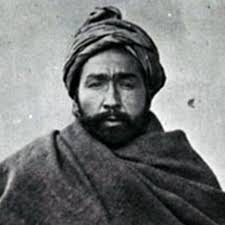بِسۡمِ اللّٰہِ الرَّحۡمٰنِ الرَّحِیۡمِ
In the Name of Allah, the Rahman, the Merciful
الصلاة والسلام عليك يا سيدي يا رسول الله
وعلى آلك واصحابك يا سيدي يا نور الله
In Muslim history several kings and rulers emerged who either committed apostasy (like Akbar the Mughal emperor) or attempted to introduce some dangerous heresy. Beginning with Al-Ma’mun, Al-Mu’tasim and Al-Wathiq, Abbasid rulers who enforced the Mihnah (Inquisition) under influence of the heretical Mu’tazilites, the orthodox Sunni Muslim community, who comprise the vast majority of the Ummah, have had to suffer persecution and harm as a consequence of such evil rulers. In modern times, various secularist rulers arose who opposed the sacred Shari’ah, the likes of Mustafa Kemal Atatürk in Turkey and King Amanullah Khan in Afghanistan. The latter initiated an evil project to modernize and Westernize Afghanistan. His wife, the wicked Queen Soraya Tarzi, who had discarded the veil influenced Amanullah Khan to relinquish the Islamic strictures imposed upon women with regard to dress and traditional gender roles. The couple were quite reminiscent of King Ahab and his wife Jezebel, the wicked Sidonian princess who influenced her husband to support the Cult of Baal in the Northern Kingdom of Israel and persecute the Israelite Prophets. In 1924, Pashtun tribesmen in Khost launched an uprising against Amanullah Khan. They were particularly incensed by Amanullah’s reforms for Westernization, involving a ban on polygamy, child marriage and encouraging things like women’s education and their discarding of the veil. Although this uprising was pacified, another one occurred in 1928, this time by the Shinwari tribesmen, again as a reaction to the misdeeds of Amanullah Khan, particularly his unholy reforms that opposed the Shari’ah. Simultaneously, the Saqqawists arose among the Tajiks north of Kabul led by a charismatic figure named Habibullah Kalakani (1891-1929), may Allah have mercy upon him.
Despite his ignoble background, Habibullah Kalakani had a fiery zeal for Islam and was incensed at the secularizing and Westernizing nature of the Amanullah Khan government. Due to the initial success of the uprising, in the beginning of 1929, the evil Amanullah Khan abdicated and fled Afghanistan. Kalakani then briefly ruled Afghanistan in 1929, until Nadir Khan, with the support of powerful Pashtun tribes, managed to depose the Tajik Kalakani and his Saqqawists. Kalakani was then executed by order of the new king, Nadir Khan. In the late 1970s, history repeated itself in Afghanistan when the Islamic forces rose up against the Communists who had managed to seize power and were, as Amanullah Khan before them, committed to enacting such social and economic reforms in Afghanistan that were plainly at odds with the sacred Shari’ah. The rise of Habibullah Kalakani against the evil Amanullah Khan reminds me of how Allah raised up the Prophet Moses against the tyrannical Pharaoh of Egypt. When the Prophet Moses arrived in the court of Pharaoh to deliver God’s Word to him, Pharaoh attempted to discredit him by reminding him that he had committed manslaughter:
وَفَعَلۡتَ فَعۡلَتَکَ الَّتِیۡ فَعَلۡتَ وَاَنۡتَ مِنَ الۡکٰفِرِیۡنَ
And you did the deed which you did, and you are among the ingrates
(Surah 26, Ayah 19)
Still, I believe that in instances where an apostate or heretical ruler seizes power in a Muslim country and begins to impose laws and customs that are contrary to the Shari’ah and to morality it is better for the Muslims to avoid launching an armed insurrection that may result in too much bloodshed and anarchy. Rather, the Islamic mystics and pious Ulama should rise up and speak with fire and brimstone against such an evil government in the spirit of the ancient Israelite Prophets like Elijah, Jeremiah and others.
والله ورسوله اعلم
And Allah and His Apostle know best!









No comments:
Post a Comment